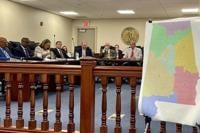MONTGOMERY, Ala. (AP) — On the eve of a court deadline, Alabama lawmakers are still divided Thursday over the map designating new congressional districts and sparred over what constitutes an “opportunity” district that the state was ordered to create for Black voters.
Republican-controlled committees in the House of Representatives and Senate continue to advance separate plans that increase the number of Black voters in the state’s 2nd congressional district but fail to establish the second majority-Black district, as sought by plaintiffs who won the last month.
Under the state Senate plan, the number of Black voters in the 2nd congressional district would increase from about 30% to 38%; under the House plan, it would increase to 42%.
“We believe it does meet the Voting Rights (Act) standard because we followed all the guidelines. As an opportunity district, nobody knows what the definition of opportunity is. They didn’t give us (a definition),” Sen. Steve Livingston said. The Republican senator from Scottsboro said the chamber settled on 38% of the population of Black voters as adequate to fulfill the court’s directive.
“So I’ve got an opportunity to lose,” said Senate Minority Leader Bobby Singleton, a Democrat from Greensboro.
Black lawmakers argued those numbers would make it impossible for a Black candidate to win in that district, and do not comply with the court directive to create a second majority-Black district “or something quite close to it.”
“There ain’t no way that in that district — that we’re dealing with here in two — that an African-American got a chance to get elected. Ain’t no way whatsoever,” said Democratic Sen. Rodger Smitherman of Birmingham.
State lawmakers face a Friday deadline to adopt new lines after the U.S. Supreme Court in June that the current state map — with one majority-Black district out of seven in a state that is 27% Black — likely violates the federal Voting Rights Act.
State republicans, who have been reluctant to create a Democratic-leaning district, are engaging in a high-stakes wager that the panel will accept their proposal, arguing that the compact scale of the districts satisfy redistricting principles, or that the state will prevail in a second round of appeals.
The panel that issued a preliminary injunction blocking use of the existing map said in 2022 that Alabama should have “either an additional majority-Black congressional district, or an additional district in which Black voters otherwise have an opportunity to elect a representative of their choice.” The judges added that any map should include two districts where “Black voters either comprise a voting-age majority or something quite close to it.”
The meaning of the terms "quite close" and “opportunity” have dominated much of the legislative debate.
“We’ve got information that’s come from the court. We’ve had information come from the justices, but much of this is speculative as to what they meant,” Senate President Pro Tem Greg Reed, the Republican leader of the Senate, told reporters Thursday.
Reed said lawmakers are working toward a compromise between the state House and Senate plans, and that the lawmakers will “absolutely” meet the Friday deadline.
Once a new GOP map is approved, the fight will shift quickly back to the courts. A Democratic state senator speculated that Alabama Republicans are seeking another Voting Rights Act challenge before the U.S. Supreme Court.
“I think the (Alabama) attorney general is setting up a war with Section 2 (of the Voting Rights Act) so once they get back they can have a real shot at gutting Section 2. That's just my gut,” Singleton said.
Plaintiffs who won the Supreme Court case have said they will challenge either proposal if enacted.
Scott Douglas, executive director of Greater Birmingham Ministries and a plaintiff in the case, said lawmakers have “apparently learned nothing from their loss at the Supreme Court, the Legislature has put forward yet another map that dilutes the electoral power of Black Alabamians.”
—-
Associated Press writer Jeff Amy contributed.
—-
Associated Press receives support from several private foundations to enhance its explanatory coverage of elections and democracy. See more about AP’s democracy initiative . The AP is solely responsible for all content.










































